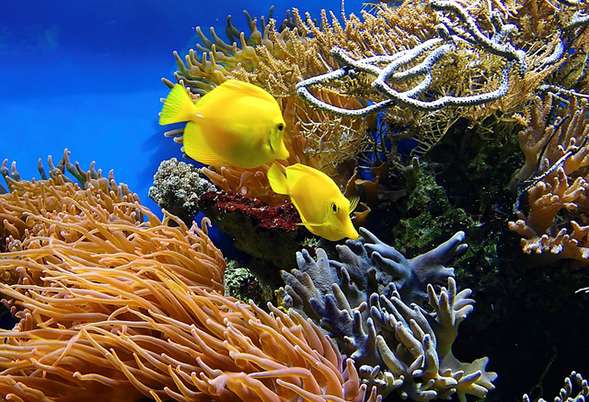Rethinking role of viruses in coral reef ecosystems

Conventional wisdom has it that within virus-bacteria population dynamics, viruses frequently kill their host bacterial cells—a process called lysis—especially when there's a large concentration of bacteria. A different dynamic called lysogeny, in which viruses lie dormant within their host cells but don't kill them, has been thought to be a relatively rare phenomenon, mostly occurring at low bacterial concentrations.
But a new study led by researchers at San Diego State University's Viral Information Institute suggests conventional wisdom has it wrong: Lysogeny might be far more common than previously thought and may even become more prevalent when hosts are densely packed in an ecosystem, which often occurs when environments are stressed. These findings could lead to a better understanding of degraded coral reef ecosystems and how to preserve them.
Algal blooms, fungal blights and bacterial infections are just a few of the ways that microbes can rapidly increase in density within an ecosystem. How viruses respond to such events is of great interest to ecologists. Traditionally, most researchers have assumed that when microbe populations boom, the viruses that inhabit them start replicating inside them—the lytic phase—boosting their own numbers but killing off their hosts.
"This suggested that lysogeny provides a temporary refuge for viruses when hosts are starving and scarce," the authors of the recent paper wrote in the study.
Previous research by Ben Knowles, a postdoctoral scholar at Rutgers University and a former graduate student within SDSU virologist Forest Rohwer's lab, upended the conventional theories of viral dynamics with the discovery of viruses that stayed lysogenic even as their host cells became more and more densely concentrated within their ecosystem. SDSU's Viral Information Institute, one of the university's self-identified areas of excellence, is among the world's leaders in researching viruses that replicate inside bacteria, otherwise known as bacteriophages.
"These earlier findings fundamentally flipped the dynamics of virus-host interaction," Knowles said.
Hoping to learn more about how viruses behave as their host numbers wax and wane, Knowles and colleagues performed a meta-analysis of 39 publications that tracked this pattern and found something surprising: There was no correlation at all between the density of host cells and whether their viruses were lytic or lysogenic, the researchers reported in the journal Nature Microbiology.
Knowles said these results should encourage microbiologists to re-calibrate population models that include virus-bacteria interactions, such as those commonly used to predict how sensitive ecosystems like coral reefs might respond to microbial overgrowth such as algal blooms and bacterial invasion.
Unfortunately, incorporating lysogeny into these models is difficult. If viruses aren't killing off hosts in predictable ways, the dynamics quickly become chaotic and hard to measure, Knowles explained. Further research might reveal precisely why viruses switch over from dormant freeloaders to replicating killers, but doing so will likely require genomic analyses of single cells—a process that is currently prohibitively expensive for large-scale projects.
Until then, the study's findings underscore how little we know about viruses and how they fit into their ecological niches, Knowles said.
"We've long thought about viruses as killers because that's what fit the models," he said. "But the way viruses interact with their hosts is much more complicated than that."
More information: Ben Knowles et al, Variability and host density independence in inductions-based estimates of environmental lysogeny, Nature Microbiology (2017). DOI: 10.1038/nmicrobiol.2017.64
Journal information: Nature Microbiology
Provided by San Diego State University




















